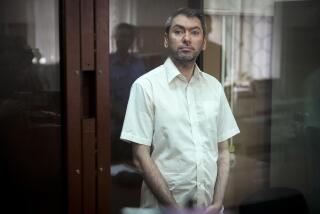Dissident Sakharov Is Right After All
- Share via
Andrei D. Sakharov is suspected by his fellow dissidents of betraying the dissident cause.
Sakharov, a man who was almost universally considered the conscience of the nation through all the long years of Brezhnevist torpor, who served as a symbol of the Soviet Union’s resistance to decay and paralysis, a man who stood like a rock through exile and torture, now is accused by a prominent emigre, Alexander M. Nekrich, of being “voluntarily or involuntarily allied with (Soviet leader Mikhail S.) Gorbachev.” Nekrich is by no means alone. There are dissidents in Moscow who suspect that Sakharov “struck a deal” with Gorbachev.
Indeed, Sakharov does support many of Gorbachev’s policies. He agrees with Gorbachev’s opposition to “Star Wars,” his views on nuclear disarmament, cultural thaw and economic reforms. He defends these policies in discussions with foreign statesmen. Many feel confused and bewildered as to how to interpret all this.
His detractors think that Sakharov is either intimidated or manipulated. I believe that his choices are as free, courageous and fair as they have always been. They also are wholly consistent with his long-held convictions to defend the underdogs in Soviet politics.
In 1968, against overwhelming odds, Sakharov took an uncompromising stance in defense of dissidents in their desperate fight for human rights against the superior forces of the KGB. In 1987, against equally overwhelming odds, he still takes the same uncompromising stance in defense of the underdogs, the reformers. In Russia reformers always have been the weaker party no matter how high their position. They always are up against the superior forces of conservatives and extremists.
It is enough to remember the fate of other reformists: Emperor Alexander II, who ruled from 1855 to 1881, Premier Petr Stolypin (1906-1911) and Nikita S. Khrushchev (1958-1964), all of whom were either murdered or ousted. Nikolai Bukharin, a reformist leader in the Communist Party during the 1920s, was executed. Sakharov doesn’t want Gorbachev to have a similar fate. If that happened, the country would leap back into Brezhnevist lethargy and could well find itself on its way to national disaster.
For almost a generation after the ouster of Khrushchev, The Soviet Union was rotting at the roots. Brezhnevism launched the nation into militaristic paranoia, social decay and moral depravity for 18 years, from 1964 until Leonid I. Brezhnev’s death in 1982. Anyone who was honest had to rebel against Brezhnevism, whatever form this rebellion took. Since its only public manifestation was the dissident movement, the impression in the West was that the major confrontation was taking place between the dissidents and the KGB.
In fact, thousands of journalists in the censored press, hundreds of scholars and, most important, dozens of Khrushchev’s heirs within the leadership itself rebelled, too. And while the dissidents “downstairs” were being routed by the KGB, the reformers “upstairs” by the mid-1980s had prevailed over their conservative rivals and started a desperate effort to get the nation moving again.
No wonder this effort inspired the reformist segment of the dissident movement; it is after all their own cause that the new leaders are fighting for. But it is just as natural that the extremist segment of the movement should see such behavior by its former comrades in arms as treason and collaboration. The moment the Brezhnevist conservatives “upstairs” were defeated, a split among dissidents “downstairs” was predetermined. It is in this sense that dissident extremism appears to be the reverse side of the Soviet conservative coin: As much as they hate each other, they need each other in their common fight against reform. And just as the conservativesmust have accused Gorbachev of collaborating with a dissident Sakharov, the extremist dissidents had to accuse Sakharov of striking a deal with Gorbachev.
In reality, there is of course no such deal. There is just a common concern for preventing a national disaster; a common belief that conservatives and extremists are equally dangerous. There is a common conviction that the only way out of the decay of Brezhnevism is through demilitarization, cultural thaw and economic reform--in short, the revitalization of the country.
The conservative-extremist opposition to reform, both inside and outside the Soviet Union, is perhaps stronger than Gorbachev and Sakharov together. The conservatives still are in a position to sabotage economic change and resist the cultural revival. The Western sympathizers of the Soviet extremists are strong enough to undermine the attempts at demilitarization.
The reformist leadership itself lacks a clear strategy for overcoming this mounting resistance. The chances are high that against all these odds Gorbachev may lose his gains just as Khrushchev did. The conservative-extremist alliance still may bring back the old regime with its militaristic paranoia and KGB terror.
This is what Sakharov is fighting against in 1987 just as he did in 1968. And this is why Sakharov’s choices, his extremist detractors notwithstanding, are as valiant and noble as they were then.
More to Read
Sign up for Essential California
The most important California stories and recommendations in your inbox every morning.
You may occasionally receive promotional content from the Los Angeles Times.










